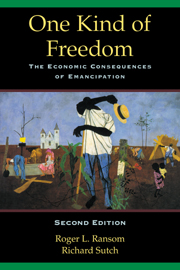Book contents
- Frontmatter
- Contents
- Preface
- Preface to the new edition
- Acknowledgments
- A note to the reader
- Chapter 1 What did freedom mean?
- Chapter 2 The legacy of slavery
- Chapter 3 The myth of the prostrate South
- Chapter 4 The demise of the plantation
- Chapter 5 Agricultural reconstruction
- Chapter 6 Financial reconstruction
- Chapter 7 The emergence of the merchants' territorial monopoly
- Chapter 8 The trap of debt peonage
- Chapter 9 The roots of southern poverty
- STATISTICAL APPENDIXES
- DATA APPENDIX
- Epilogue
- A Bibliography of Literature on the South after 1977
- Notes
- Bibliography
- Index
Chapter 1 - What did freedom mean?
Published online by Cambridge University Press: 05 October 2013
- Frontmatter
- Contents
- Preface
- Preface to the new edition
- Acknowledgments
- A note to the reader
- Chapter 1 What did freedom mean?
- Chapter 2 The legacy of slavery
- Chapter 3 The myth of the prostrate South
- Chapter 4 The demise of the plantation
- Chapter 5 Agricultural reconstruction
- Chapter 6 Financial reconstruction
- Chapter 7 The emergence of the merchants' territorial monopoly
- Chapter 8 The trap of debt peonage
- Chapter 9 The roots of southern poverty
- STATISTICAL APPENDIXES
- DATA APPENDIX
- Epilogue
- A Bibliography of Literature on the South after 1977
- Notes
- Bibliography
- Index
Summary
1. Neither slavery nor involuntary servitude, except as a punishment for crime whereof the party shall have been duly convicted, shall exist within the United States, or any place subject to their jurisdiction.
2. Congress shall have power to enforce this article by appropriate legislation.
Constitution of the United States, Amendment XIII, ratified December 6, 1865.At the conclusion of a long and bloody civil war, with their emancipation from slavery and involuntary servitude, over 4 million Americans were permitted a kind of political and economic freedom for the first time in their lives. Beyond doubt, this change in the status of black Americans was accompanied by an unambiguous and substantial improvement in their economic well-being. It is also probable that most blacks were emboldened and enheartened by emancipation. But whatever the ex-slave's initial reactions to freedom – with its opportunities, its responsibilities, and its uncertainties – the material gains were real and stimulated an optimistic view of the potential for further economic advancement. This optimism was further reinforced when black workers found that they possessed the power, not only to shape their own destinies within the society in which they found themselves, but also to change that society, at least in a limited way. For nearly two and one-half centuries, black slave labor had been an integral part of southern life. Emancipation had destroyed the foundations of the southern economy and southern society.
- Type
- Chapter
- Information
- One Kind of FreedomThe Economic Consequences of Emancipation, pp. 1 - 13Publisher: Cambridge University PressPrint publication year: 2001



